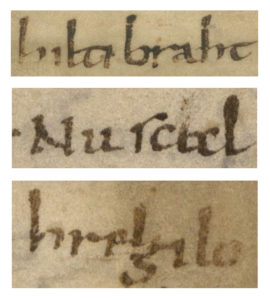URCA Assistant Robin Cummins Corrects 9th Century Writing Errors
“The URCA Program has provided me with the opportunity to immerse myself into an experience that I would otherwise not have the ability to engage in.”–Robin Cummins

Writing samples from “Song of Hildebrand.”
Undergraduate Research and Creative Activities (URCA) Assistant, Robin Cummins has been busy working on examining one of the oldest known poems in German history, “Hildebrandslied” or “Song of Hildebrand.” Composed at the end of the 8th century, the poem details the story of a man who is tragically reunited with his son following his abandonment.
“To pledge loyalty to his lord, Hildebrand abandoned his wife and son only to come into contact with him later and upon reuniting, Hildebrand has two options–to kill his son or let his son kill him, but the document is cut off and we really have no idea how the story ends,” stated Cummins. The focal point is not so much the story itself though, but the errors that the scribes made at the time when transcribing the document. Cummins has been working on the project since last fall with Dr. Douglas Simms, chair and professor of German in the Department of Foreign Languages and Literature.
“People back then are identical to people today–they, too, made writing errors,” commented Simms. “Back then, the writing materials were much more costly though.” Simms detailed how scribes attempted to fix their errors through scraping, albeit quite laborious, or more commonly through writing over the miswritten letters in an attempt to transform them into what they had originally intended. Other times, scribes, much like us today, did not even realize they made an error. “The really neat thing about this process is reconstructing the moment the document was created. Like, what happened when the scribe’s pen slipped…it is a very human moment and in this gulf of 1200 years, things have not really changed that much,” stated Simms.
The last thorough and comprehensive palaeographic examination of “Song of Hildebrand” dates back to 1919 and both Cummins and Simms have benefited greatly from the collaborative process. “It has been really great working with Dr. Simms on this project–I have learned so much from him,”commented Cummins. “The URCA Program has provided me with the opportunity to immerse myself into an experience that I would otherwise not have the ability to engage in.” Cummins is a senior double majoring in English and German, with a minor in creative writing and European studies. She plans to graduate in May and pursue a graduate program in Germanic Philology.
Filed Under: Foreign Languages & Lit












